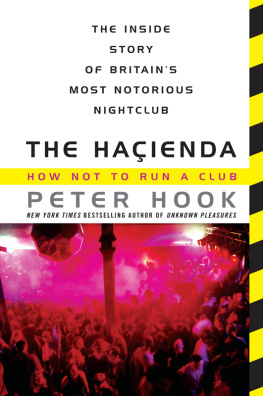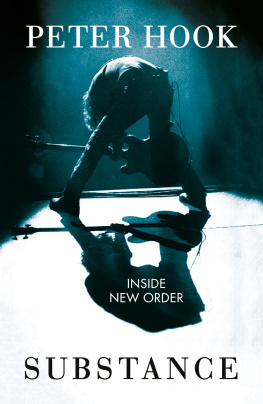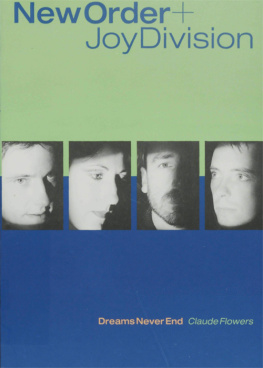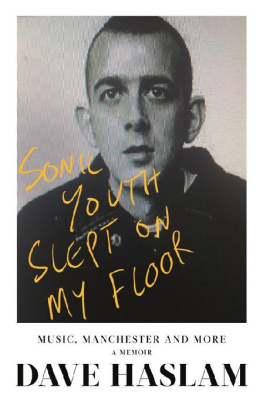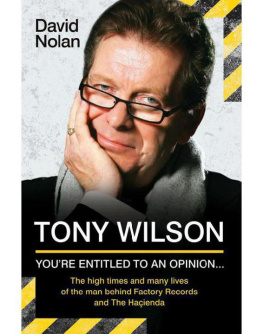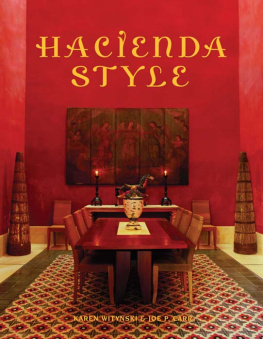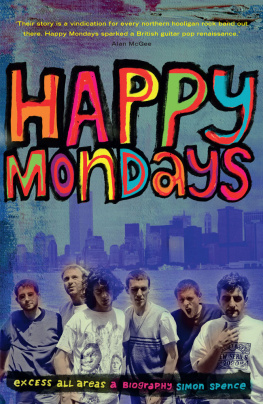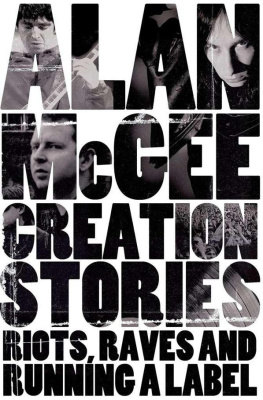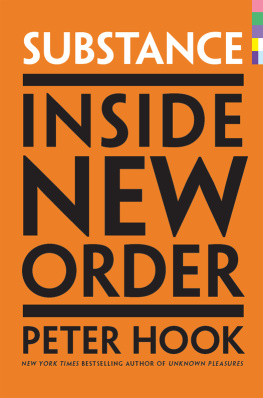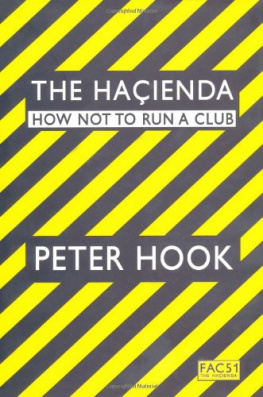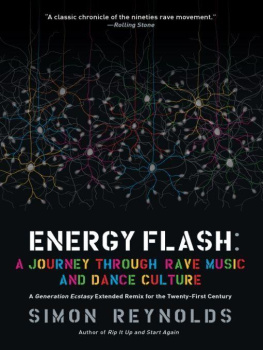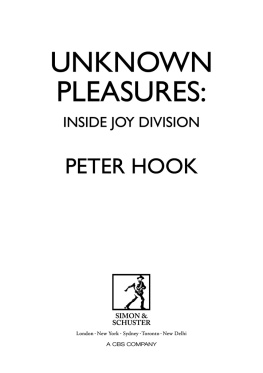Contents
Dedicated, with love, to my mother, Irene Hook
Rest in peace:
Ian Curtis, Martin Hannett, Rob Gretton, Tony Wilson and Ruth Polsky,
without whom the Haienda would not have been built
What a fuck-up we made of it.
Or did we? Sitting here now, I wonder. Its 2009 and the Haienda has never been more well known. Still doesnt make any money, though; no change there then. This year we celebrate twenty-one years of acid house; we are holding Haienda nights all across the UK and now have merchandise deals for CDs, T-shirts, shoes, postcards, posters, a bespoke bike frame, even a fine-art project with Ben Kelly, for Gods sake. Where will it end?
It looks as though our manager Rob Gretton was right about the Haienda, just as he was at Ian Curtiss wake when he told us, Joy Division will be huge in ten years time. It wasnt much solace at that particular moment but he was spot on: Joy Division were huge in ten years; also in twenty and thirty years. Still are. A great testament to the music.
Then, when the Haienda was going bankruptvoluntarily, I might addhe said we needed to buy all the names from the receiver.
Why? I said.
Theyll be worth something in the future.
No chance, I thought. Who cares? I was sick of it.
He cared. No one else was interested so I gave him the money to buy them. Since then its been a long, hard process of tying up the loose ends. A never-ending stream of registrations and legal fees. Battles with bootleggers. But we got there in the end. Now, hopefully, we can enjoy the fruit of our labours...
But I need to tell you the story first, dont I? I need to tell you how the Haienda changed the shape of clubbing in England. Where it all went wrong, and how what should have been a dream come true became a cautionary tale.
And what a story it is. Because while theres a lot about the Haienda that shouldnt be glorifiedthe gangsters, the drugs, the violence, the copstheres also the stuff of legend: the fact that it was a superclub before the term had even been invented; that it was the birthplace of acid house in the north and the home of Madchester, two musical movements that went round the world; that it was the scene of too many great nights and gigs to recallnot that you were in any state to do so.
When the Haienda opened, Factory and New Order had no experience running a commercial enterprise; we just invested our money and trusted the staff, mostly our friends, to sort everything out. Bad idea. Your friends are your friends not because theyre good at business. But we learned that the hard way. We learned everything the hard way.
At first the band didnt have much to do with it; in fact, for the first few years, I didnt even use my connection with the Haienda on a social level let alone get involved in the business side of things. I never felt involved with it, to be honest. I got free entry and that was about it (some members of the band couldnt even manage that sometimes); so even though I had this clubthis huge club costing me a fortuneI was reluctant to go, and certainly didnt feel like it was mine any more than a punter would. None of us did. But, as the problems mounted, we had to get more and more involved, until by 1988 I was helping to run it. By that time the mess was too big for anyone to fix.
And I was into it too far to get out.
As my accountant likes to tell me, I wont appreciate how much cash the Haienda lost until I stop earning money.
Then, he says, itll hit you like a juggernaut.
We once worked out that, from the time it opened in 1982 to when it closed in 1997, each punter through the door cost us 10. We wasted that much through bad management and sheer stupidity. As far as we were concerned it was history we were making, not money. But if Im ever skint Ill walk around Manchester asking everyone to give me my tenner back.
Ill split it with the rest of them, honest.
Beyond that, though, Ill never truly know how much money we lost on the Haienda because our record label, Factory, New Orders partner in the club, never accounted to the band, ever: no one has ever told us how many records we sold in England or around the world.
So Tony Wilson, who owned Factory, wouldnt say, New Order just sold 100,000 albums in China, heres your cut of the profits. Instead, the way it worked was that Rob would collect royalties by walking in and demanding cash off him. If Tony had money, hed give it to him; if he didnt, hed tell Rob to fuck off. That was how they ran it. With our approval, I should add. It was chaos, punk, anarchy and we loved it.
Well, back then we did. Now, of course, it just seems like a good old-fashioned mess. Because not only were we never told how much wed earned, but also we werent told how much wed invested in the club, either, so we cant know for certain how much of our earnings were used to keep the Haienda afloat. It was clearly a huge fuck-up, but one well never be able to gauge the true scale of.
As my mother Irene used to say, God rest her soul, Youll never get into trouble if you tell the truth, our Peter. Lets see if shes right. This book is the truth, the whole truth, and nothing but the truth.
As I remember it.
Hooky, 2009
The Haienda was, as Hook says, in many ways the perfect example of how not to run a clubif you view a nightclub as a moneymaking business. But if, like the baggy trousered philanthropists Factory, you see it as an altruistic gift to your hometown and a breeding ground for the next generation of youth culture, it was, accidentally, purposefully, shambolically, anarchically, thrillingly, scarily, inspirationally perfect.
Observer
Hook himself is revealed as a born anecdotalist, firing off quips, pithy asides and self-lacerating mea culpas like a scattergun. The sections that interweave his narrativeDJ playlists, club nights, minutes of board meetings, pie-in-the-sky company accounts, a roll call of artists, including Madonna, who appeared at the clubare often revealing or evocative, but it is the authors own voice that makes the book such a compelling read.
Sunday Times
A testosterone-scented transcript of ripping yarns.... Theres much fun to be hand withinmuch like the Haienda itself.
Q Magazine
Peter Hooks book lifts the lid on the true story behind the legendary Manchester club that brought acid-house music to the north and changed the face of UK clubbing forever.... Hookys memoir offers a real insight into what actually happened.
Independent
A delightfully pungent, occasionally depressing, generally very funny insiders account.
Metro
Chiming perfectly with the nations twin fears of urban violence and monetary collapse, this book should become a cautionary tale of modern times.
Mojo, five stars
A worthy addition to the archives of glorious rock follies, recounted with candor, humor and gob-smacking detail.
Scotland on Sunday
Its to Hooks admirable credit that he can reflect on the fifteen years when the Haienda lurched from disaster to disaster, via calamity and catastrophe, with only modest rancor and a great deal of gallows humor.
Uncut
It was the party to end all partiesfourteen years of heroism and debauchery which revolutionized nightlife in Britain forever, created acid house and the concept of clubbing as we know it. The Haienda not only transformed Manchester but had a phenomenal impact on the UK as a whole, an impact which continues to shape our lives today.
Scottish Daily Record
A hugely candid work.
Word
Prologue: One Night
at the Haienda, 1991
Its eleven oclock Saturday morning and Im well up for it. Tonights going to be a big night for me. Im doing the door in my own nightclub, the Haienda: the biggest, wildest place in Manchester, in England and possibly the world. Where everything happens and anyone whos anyone goes to do it.
Next page
